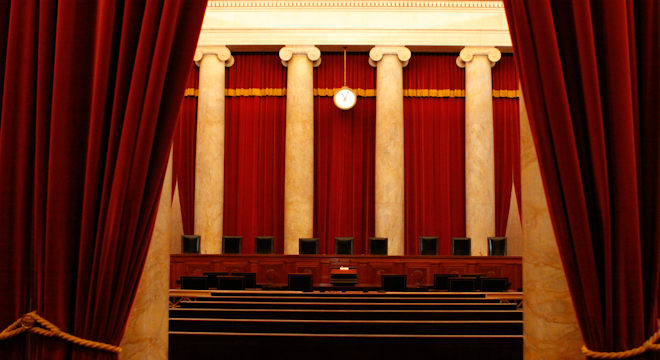Supporters of affirmative action in higher education were dealt a tough blow on Wednesday in blockbuster oral arguments before the Supreme Court, according to legal experts. The question now is whether the impact will be narrow, or whether the Court will toss out affirmative action’s broader legal underpinnings.
The case, Fisher v. University of Texas, was brought in 2008 by a white woman, Abigail Noel Fisher, who said she was unfairly denied admission to the University of Texas-Austin as a result of its affirmative action program, which guarantees admission to the top 10 percent of each Texas high school’s graduating class. The Court is considering whether to simply overturn UT’s approach as unconstitutional or to scrap or reshape the broader legal foundation of affirmative action in higher education, the 2003 case Grutter v. Bollinger.
“I am pretty certain Texas will lose on one theory or another, but I doubt the Court will overrule Grutter,” said Brian Fitzpatrick, a professor at Vanderbilt University School of Law and former clerk to Justice Antonin Scalia.
Even before the arguments, UT’s affirmative action program was in a great deal of jeopardy, with the five conservative justices considered as hostile to the deferential nature of Grutter. That conventional wisdom was largely reinforced on Wednesday, with Chief Justice John Roberts leading the charge in questioning the university’s case for admissions policies aimed at achieving a “critical mass” of racial diversity.
Roberts attacked the integrity of such a system, needling UT’s lawyer over how the institution verifies that students are telling the truth about their ethnicity. When he didn’t get a satisfactory answer, he retorted, “They don’t monitor, but race is the only one of your holistic factors that appears on the cover of every application, right?”
Justice Anthony Kennedy, seen as a possible swing vote, wasn’t friendly to the university’s case. “What you’re saying is what counts is race above all,” he told its lawyer.
Justice Antonin Scalia was characteristically colorful in his line of questioning.
“How do they figure out that particular classes don’t have enough [racial diversity]?” he said. “What, somebody walks in the room and looks them over to see who looks Asian, who looks black, who looks Hispanic? Is that how it’s done?”
The three liberal-leaning justices, particularly Justice Sonia Sotomayor, went to bat for affirmative action as a way to level the playing field in a society with a long history of discrimination against minorities. (Justice Elena Kagan, having worked on the issue as the Obama administration’s solicitor general, did not participate.) The justices openly expressed concern that Grutter could be neutered in the decision.
“Why overrule a case into which so much thought and effort went and so many people across the country have depended on?” said Justice Steven Breyer.
Fitzpatrick speculates that “the Court will recast Grutter in a way that makes universities confront the notion of critical mass in a more serious way, and that this will make it more difficult to legally practice affirmative action.”
A 4-4 tie vote would leave UT-Austin’s admissions program intact.
But even proponents of affirmative action don’t see much reason for optimism.
“Whatever happened to originalism?” said Adam Winkler, a constitutional law professor at UCLA. “Scalia and Thomas claim to be originalists but it’s clear that the framers of the Fourteenth Amendment enacted laws employing racial classifications designed to integrate African Americans. … Once again, we see that many proponents of originalism are really just conservatives for whom history is used as a sword to strike down progressive legislation.”










